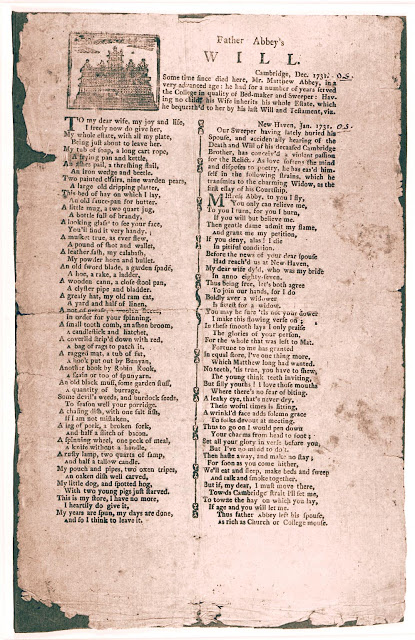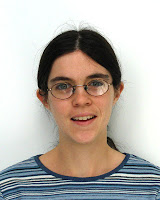Fall is upon us, when the students are back in school and alumni spirit runs high, so it seemed an apt time to highlight an early piece of Harvard/Yale humor: Father Abbey’s Will.
 |
| John Seccombe (1708-1792), “Father Abbey’s will.” [Boston ?, ca. 1780] A 780f |
This broadside consists of two comic poems. The one on the left is the supposed will of Matthew Abdy, a real-life Harvard College housekeeper. Abdy was appointed the College Sweeper and Bedmaker in 1718 and served until his death in 1730 or 31. The poem listing the contents of his estate was written by Harvard alum Rev. John Seccombe and it first appeared anonymously in Boston’s Weekly Rehearsal newspaper on January 3, 1732:
To my dear wife, my joy and life,
I freely now do give her,
My whole estate,
With all my plate,
Being just about to leave her.
My tub of soap,
A long cart rope,
A frying pan and kettle,
An ashes pail,
A threshing flail,
An iron wedge and beetle.
Two painted chairs,
Nine warden pears,
A large old dripping platter,
This bed of hay
On which I lay,
An old saucepan for butter.
A little mug,
A two quart jug,
A bottle full of brandy,
A looking glass
To see your face,
You ll find It very handy.
A musket true,
As ever flew,
A pound of shot and wallet,
A leather sash,
My calabash,
My powder-horn and bullet.
An old sword blade,
A garden spade,
A hoe, a rake, a ladder,
A wooden can,
A close-stool pan,
A clyster-pipe and bladder.
A greasy hat,
My old ram cat,
A yard and half of linen,
A woollen fleece,
A pot of grease,
In order for your spinning.
A small tooth comb,
An ashen broom,
A candlestick and hatchet,
A coverlid
Strip d down with red,
A bag of rags to patch it.
A ragged mat,
A tub of fat,
A book put out by Bunyan,
Another book
By Robin Rook,
A skein or two of spunyarn.
An old black muff,
Some garden stuff,
A quantity of borage,
Some devil s weed,
And burdock seed,
To season well your porridge.
A chafing dish,
With one salt fish
If I am not mistaken,
A leg of pork,
A broken fork,
And half a flitch of bacon,
A spinning wheel,
One peck of meal,
A knife without a handle,
A rusty lamp,
Two quarts of samp,
And half a tallow candle.
My pouch and pipes,
Two oxen tripes,
An oaken dish well carved,
My little dog,
And spotted hog,
With two young pigs just starved.
This is my store,
I have no more,
I heartily do give it,
My years are spun,
My days are done,
And so I think to leave it.
Five weeks after the Harvard poem ran,a second poem appeared in the February 7, 1732 issue of the Weekly Rehearsal, purporting to be a love letter to the Harvard sweeper’s widow, from the Yale Sweeper. This poem has at times been attributed to a Connecticut physician named John Hubbard, but it is more likely that the new verse was itself also by Seccombe. It appears on the right side of our broadside (the last two lines are part of an epitaph that was added later and doesn’t appear in Seccombe’s original rendition of the poem.)
Mistress Abbey, To you I fly,
You only can relieve me,
To yon I turn,
For you I burn,
If you will but believe me.
Then, gentle dame,
Admit my flame,
And grant me my petition,
If you deny,
Alas ! I die
In pitiful condition.
Before the news
Of your dear spouse
Had reached us at New Haven,
My dear wife dy’d,
Who was my bride
In anno eighty-seven.
Thus being free,
Let’s both agree
To join our hands, for I do
Boldly aver
A widower
Is fittest for a widow.
You may be sure
Tis not your dow’r
I make this flowing verse on ;
In these smooth lays
I only praise
The glories of your person.
For the whole that
Was left by Mat.
Fortune to me has granted
In equal store,
I’ve one thing more
Which Matthew long had wanted.
No teeth tis true
You have to shew,
The young think teeth inviting ;
But, silly youths !
I love those mouths
Where there s no fear of biting.
A leaky eye,
That s never dry,
These woful times is fitting.
A wrinkled face
Adds solemn grace
To folks devout at meeting.
Thus to go on
I would put down
Your charms from head to foot,
Set all your glory
In verse before ye,
But I’ve no mind to do it.
Then haste away,
And make no stay ;
For soon as you come hither,
We’ll eat and sleep,
Make beds and sweep
And talk and smoke together.
But if, my dear,
I must move there,
Tow’rds Cambridge straight I ll set me
To touse the hay
On which you lay,
If age and you will let me.
Thus father Abbey left his spouse,
As rich as Church or College mouse,
Needless to say, Abdy’s widow Ruth didn’t take up the offer. Some sources indicate she herself became sweeper upon Matthew’s death; she died in Cambridge in 1762. The pair of comic poems proved quite popular; they were printed in newspapers and about 25 broadside printings (like ours) are known, dating up thorough the beginning of the 19th century. Our copy dates from around 1780.

